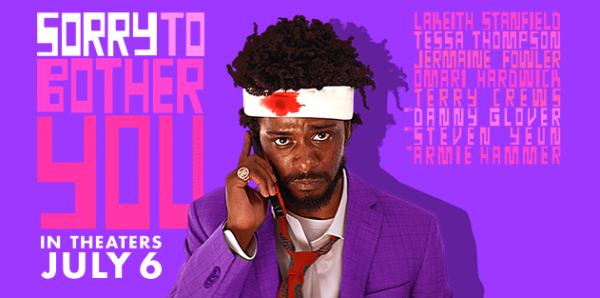"Sorry to Bother You" - Review

I’ve tried writing this review about twenty different times. There’s so much to unpack in Boot’s Riley’s Sorry to Bother You that I honestly don’t know where to start, or how to get into it without spoilers. So here’s my take away up front: Sorry to Bother You is one of the most brilliant movies of the year. Full stop. It’s also one of the most insane movies to be released in theaters in a while. It’s a surreal, funhouse mirror reflection of our current society and the state of race relations. Seriously, stop reading this review and go out and see it. The less you know about this film going in, the better; however, I’ve been tasked with writing a review, so here we go (minor spoilers follow) ...
In the Oakland of the not too distant future, Cassius “Cash” Green (Lakeith Stanfield) lives with his girlfriend Detroit (Tessa Thompson) in a garage attached to his uncle’s (Terry Crews) house. As the film opens, Cash is hired by a telemarketing company, RegalView. At first unable to make a sale, Cash is given advice by a co-worker (Danny Glover) to adopt a “white voice.” Cash does this in a bit of magical realism where Stanfield is dubbed over by David Cross. This gimmick works, and Cash finds himself rising in the ranks at RegalView — and when he finds himself in the higher echelons, he uncovers a conspiracy involving the company WorryFree (which is what would happen if companies like Uber and Postmates were actually indentured servitude), and its CEO Steve Lift (Armie Hammer). And that’s all I’m gonna say about the plot.
As I said up top, Sorry to Bother You is brilliant. It’s a pitch-black satire that’s also laugh out loud hilarious. Boots Riley manages to make a truly bonkers movie have a form of narrative coherence. There are moments that recall Verhoven’s RoboCop, Alex Cox’s Repo Man and a little bit of the opening section of Being John Malkovich. The film has also been compared to an episode of Black Mirror, but for me the film felt closer to a Philip K. Dick novel. In fact Sorry to Bother You is a closer adaptation of the themes and ideas of Philip K. Dick than most Dick adaptations! The idea of an Uber-esque company basically becoming indentured servitude centers is straight of a Dick novel, but also the futility and hopelessness of modern life. The difference is, Dick was mostly writing about the counterculture of the 1960s, and specifically how the state was controlling the white middle class. Riley on the other hand is exploring how these things affect the black lower class. The result is an astonishing debut for writer/director Riley, showing him to be a filmmaker to watch.
The performances across the board are great. In a lot of satires of this type the acting could go too broad, but here everyone brings pathos to their character. Stanfield pulls off with just a slouched walk a character that is beaten down by life and a system designed to keep him in mediocrity. When he adopts the “white voice” Stanfield doesn’t go over the top with pantomime; instead, it feels like a real performance. The always-brilliant Tessa Thompson plays the revolutionary Detroit with heart and humor.
There’s so much more to say about the film that I could go on and on. I haven’t even talked about the reality TV show in the movie called I got the S#*@ Kicked Out of Me where people get beaten up and debased in front of a live T.V. audience. Or how pitch-perfect the upper management speak of the telemarketing company with absurd mixed metaphors. Many, many, many college theses will be written about the film in the coming years. It’s an absolutely stunning and important work that belongs in the canon of science fiction satires. See it immediately.
Four out of Four stars.
 WhoRepresents.com is safe & secure
WhoRepresents.com is safe & secure